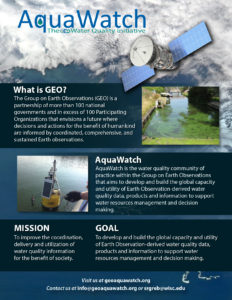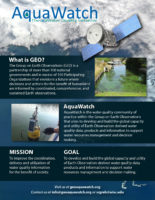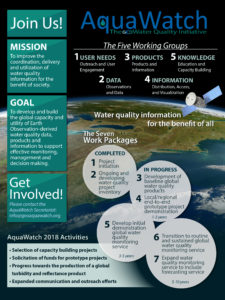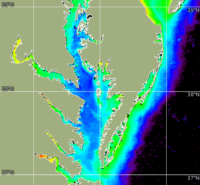Water Quality Information for the Benefit of Society
Earth Observation of inland and coastal water quality: recent developments, priorities & public engagement
29-31 August 2018, University of Stirling, Stirling, UK
A joint meeting co-organised by GEO AquaWatch & the NERC GloboLakes project
GEO AquaWatch and GloboLakes invite contributions to a workshop from the developer and user communities of Earth Observation (EO) data in inland and coastal environments.
Inland and near-shore coastal environments deliver multiple ecosystem services that benefit society, including food, water, energy, navigation and recreation resources that contribute to our economies, whilst also being crucial to regional and global-scale biogeochemical cycles. Freshwater availability is ranked among the greatest threat to global economy, and yet only a fraction of global inland water systems are routinely monitored for water quality.
The United Nations development agenda now fully recognises the importance of managing water resources to reach sustainable development goals (SDG 6, and related) and fosters collaboration across countries. Global Climate Observing System (GCOS) also recently deemed satellite-derived lake temperature, ice cover, and water-leaving reflectance as Essential Climate Variables. Data collection by EO satellites is expanding, and its suitability for observing inland and near-coastal water bodies makes remote sensing a valuable source of water quality data and ecosystem condition at local and global scales. The workshop marks the culmination of the six-year GloboLakes project funded by the UK Natural Environmental Research Council, featuring the latest applications of EO to inland and near-shore coastal waters at local, regional and global scales and contributions to improved water management, climate studies, and achieving SDGs. We will foster discussions of data and technology challenges, linkages between EO data providers and stakeholders, community-based water monitoring, and future GEO AquaWatch activities. The workshop will have presentations from many international projects and partnerships, providing unique opportunity to engage with the international water quality EO community.
Logistics: When: 29-31 August 2018
Where: Stirling UK (~30 miles from Edinburgh airport)
Registration: Cost of Accommodation and Meals £85 per day
Please Click HERE to register and book and pay accommodation and meal
Deadline to Register: 31st July 2018.
Organising committee:
Andrew Tyler: University of Stirling, UK
Evangelos Spyrakos: University of Stirling, UK
Steve Greb: GEO AquaWatch, USA
Carsten Brockmann: Brockmann Consult, Germany
Ghada El Serafy: Deltares, Netherlands
Douglas Cripe: GEO Secretariat, Switzerland
Merrie Beth Neely: GEO AquaWatch, USA




